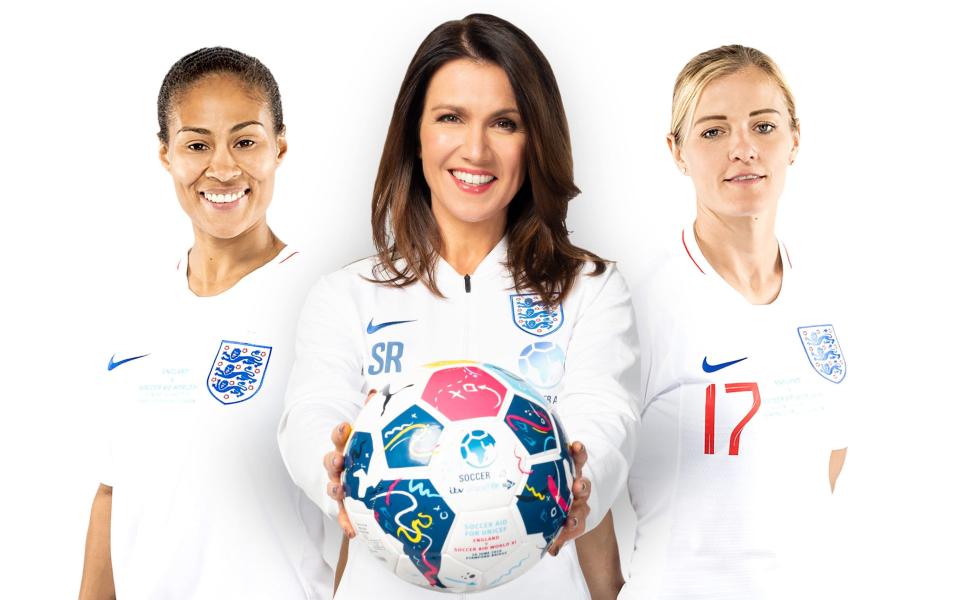Men and women to join forces in charity match to showcase gender equality


This is a transformative summer for women’s sport in Britain. An average audience of 4.6 million viewers tuned in to BBC One for England’s World Cup opening win against Scotland last Sunday. Johanna Konta ended a 36-year gap between British representation in the French Open semi-finals last week and the England cricket team, the defending World Cup champions, qualified for the 2021 tournament during their whitewash of West Indies as they build to the Ashes next month.
On the horizon is the Netball World Cup in Liverpool with England, the 2018 Commonwealth gold medallists, well placed to sustain this feelgood factor under the watchful eye of coach Tracey Neville. The nation’s thirst for Wimbledon never dissipates and the presence of Katie Boulter and Katie Swan will alleviate the increased spotlight on Konta. British golf has also never been stronger, with three players – Charley Hull, Bronte Law and Georgia Hall – in the world top 30.
On Sunday the potential to expand the reach of women’s sport takes a dramatic shift when more than 40,000 spectators are expected at Stamford Bridge to watch Katie Chapman and Rachel Yankey become the first female footballers to play in the Soccer Aid for Unicef charity match. England will face a Soccer Aid World XI including Usain Bolt and it will be broadcast on ITV. Last year’s match was watched by four million viewers.
The former England internationals will play alongside their male counterparts, comprising a mix of celebrities and ex-professional footballers, for the first time and it is supported by the Football Association as part of its study into mixed participation in recreational football.
For both Yankey and Chapman it is an opportunity to dust off their boots and showcase their talents, which earned them a total of 223 England caps.
Yankey, who won every domestic title in England, including the domestic quadruple with Arsenal and W-League in the United States, retired from playing three years ago and has just spent her first full season coaching Women’s Championship side, London Bees.

Chapman, who also swept the board in the domestic game and was part of the England side who finished third at the 2015 World Cup in Canada, stopped playing last summer and is now Chelsea’s first female ex-professional club ambassador. She admits stepping away from playing has been difficult but her three sons, aged six to 16, have helped with the transition.
“It’s been tough to step away from the football field but on the other side I get to see my children grow up,” Chapman told Telegraph Sport. “My life is completely taken over by football, but just their football – taking them to training and games – which is brilliant. I have struggled with making the change. My new role as the club’s first female football ambassador has given me the opportunity to stay in the women’s game and continue to help promote it. It’s just taken a little time to get my head around the whole thing.”
For Yankey, the opportunity to inspire the next generation of footballers remains a top priority. Even if she is balancing her head coach role at London Bees and bringing up her daughter, who will be two in August.
“We talk a lot about girls having the chance to play football, having equal opportunities, but now we have an opportunity to show that to a different audience,” she said.
“I’ve worked in primary schools for a long, time and encouraged both boys and girls to play football and sport in general and to have no judgment. There are lots of life lessons to take away from PE: confidence, communication, team building and resilience. You might not become an elite athlete but you might take that into your job and your self-esteem.”

Yankey also spoke in admiration of the women who juggle their playing careers with motherhood. “I look back now and Mary Phillip, who used to be my old room-mate at Arsenal and England, brought up two boys. I never appreciated what she went through,” she said.
“I have full admiration for the players who have been able to manage it. It’s not easy to try and get back to a normal life and normal routine. When you’re a footballer, you have a selfish routine because you know what you’re planning for. With a child, you’re just off the rails on that. That’s why it’s been difficult at London Bees. I went there as a coach to complete my A licence. I did that and then they offered me the opportunity to take over the team.”
Her time in the gym may have been limited, a problem for many working mothers, but Yankey maintains that drive which earned 129 England caps. “It’s about making a commitment and showing women out there that have got young children that you’re able to do different things.”
It is widely known that Yankey used to cut her hair short so boys on the playground did not know she was a girl. On reflection she feels there was no need to take such action and feels young boys do not see gender, they see ability.
“That’s why it’s so important to have this match and the exposure it brings to show men and women playing the same game. It doesn’t matter what happens on the pitch, it’s about the visibility of putting people on the pitch and seeing them for what they rightfully are and that this is the pitch where everyone can play and we’re all equal.”
England v Soccer Aid World XI takes place at Stamford Bridge on Sunday.

 Yahoo Sport
Yahoo Sport 





































